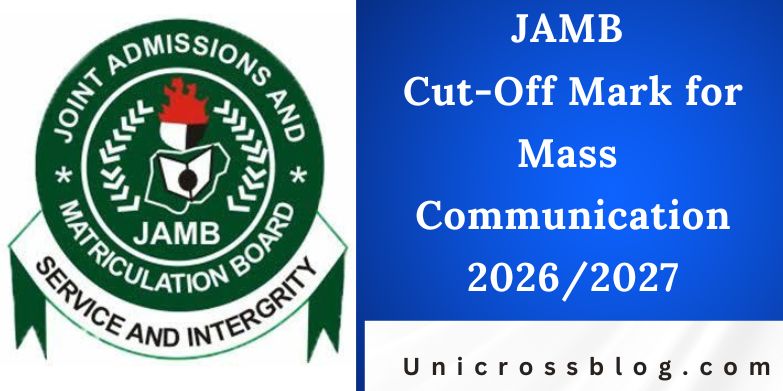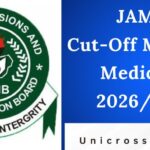The JAMB cut-off mark represents the lowest score a candidate must achieve in the UTME to qualify for consideration in the admission exercise. It is not a fixed number for all courses or institutions; rather, JAMB announces a national benchmark during its annual policy meeting, typically held in July or August preceding the academic year. Institutions then adopt or exceed this benchmark based on their capacity and priorities.
For the 2026/2027 session, the national cut-off remains consistent with recent trends at 140 for degree-awarding universities and 100 for other tertiary institutions. This threshold ensures a broad pool of applicants while allowing universities to filter through post-UTME screenings. Meeting the cut-off alone does not guarantee admission; it merely unlocks the next stage. Factors like O’Level results, post-UTME performance, and catchment area policies further influence outcomes.
In essence, the cut-off mark acts as a quality control mechanism, promoting meritocracy in Nigeria’s education system. For Mass Communication, where creativity and communication prowess are key, excelling beyond the minimum signals readiness for the program’s rigors.

JAMB Cut-Off Mark for Mass Communication 2026/2027
Mass Communication, classified under the arts and social sciences faculty, attracts thousands of applicants annually due to its relevance in today’s media-saturated society. Consequently, cut-off marks for this course tend to be elevated compared to less competitive programs.
The baseline JAMB cut-off for Mass Communication in universities is 140, but most federal and state universities demand at least 180 to 200. Polytechnics and colleges of education, offering National Diploma (ND) or Nigeria Certificate in Education (NCE) equivalents, maintain lower thresholds at 100, making them viable options for candidates with moderate scores. These figures are provisional and subject to confirmation at JAMB’s policy meeting, but historical patterns suggest stability.
Admission into Mass Communication also hinges on subject combinations: candidates must select four subjects in UTME, including Use of English (compulsory), Literature in English, and two from Government, Economics, CRS/IRS, or History. Scoring well in these areas can elevate your aggregate.
To illustrate institutional variations, consider the competitive nature of top universities. High demand often leads to merit lists favoring scores above 250, especially in urban centers like Lagos and Abuja.
Institutional Cut-Off Marks for Mass Communication
Different institutions set unique cut-off marks for Mass Communication, influenced by their prestige, location, and enrollment quotas. Federal universities typically enforce stricter standards, while state and private ones offer some flexibility. Below is a table summarizing expected cut-off marks for select institutions offering Mass Communication in the 2026/2027 session. These are based on trends from previous years and may adjust slightly post-UTME.
| Institution | Type | Expected Cut-Off Mark | Notes |
|---|---|---|---|
| University of Lagos (UNILAG) | Federal University | 200 | Highly competitive; post-UTME required. Aggregate often exceeds 65%. |
| Ahmadu Bello University (ABU), Zaria | Federal University | 180 | Strong emphasis on merit; catchment areas prioritized. |
| University of Nigeria, Nsukka (UNN) | Federal University | 180 | Requires strong O’Level credits in English and Literature. |
| Delta State University (DELSU), Abraka | State University | 170 | Lower for indigenes; focuses on practical media skills. |
| Nnamdi Azikiwe University (UNIZIK), Awka | State University | 180 | Includes aptitude tests in screening. |
| Covenant University, Ota | Private University | 200 | Holistic admission; interviews common. |
| Federal Polytechnic, Oko | Polytechnic | 100 | ND program; easier entry but competitive job market. |
| College of Education, Ekiadolor | College of Education | 100 | NCE in Mass Communication; bridges to degree programs. |
| Yaba College of Technology (YABATECH) | Polytechnic | 120 | Renowned for media production courses. |
| University of Port Harcourt (UNIPORT) | Federal University | 180 | Rising demand due to oil-rich region media needs. |
Factors Influencing Cut-Off Marks
Several elements shape the final cut-off marks for Mass Communication. First, candidate performance in UTME plays a pivotal role; a year with high average scores pushes thresholds upward. Second, institutional popularity matters: programs in metropolitan universities like UNILAG see fiercer competition, inflating marks.
Admission quotas, set by the National Universities Commission (NUC), limit slots, prompting higher cut-offs. Catchment policies favor indigenes, potentially lowering effective marks for locals. Economic trends, such as growing demand for digital media experts, also boost interest in the course.
Post-UTME screenings, conducted by most universities, combine UTME scores (often weighted 50%) with screening results to compute aggregates. O’Level grades, requiring at least five credits including English and Mathematics, add another layer. Understanding these dynamics encourages strategic preparation, like targeting less saturated institutions or excelling in supplementary exams.
How to Meet and Exceed the Cut-Off Mark
Achieving the cut-off for Mass Communication demands proactive effort. Start with thorough UTME preparation: allocate time to core subjects, using past questions and mock exams. Resources like JAMB syllabi and study guides can sharpen your focus on high-yield topics.
Post-UTME readiness is equally vital. Practice aptitude tests emphasizing comprehension, essay writing, and current affairs, as these mirror Mass Communication’s demands. Maintain a balanced O’Level profile; retake WAEC/NECO if needed to secure required credits.
Consider alternatives: if scores fall short, explore polytechnics for ND then HND-to-degree top-ups, or related fields like Performing Arts. Change of course via JAMB portal is an option before post-UTME. Finally, track announcements through official channels and join aspirant forums for real-time insights. Persistence, coupled with scores above the minimum, turns aspirations into admissions.
READ ALSO: Updated JAMB Areas of Concentration for Agricultural Science 2026/2027
FAQs
What is the minimum JAMB score required for Mass Communication in universities for 2026/2027?
The national minimum is 140, but most universities require 180 to 200. Check your preferred institution for specifics.
Can I study Mass Communication with a JAMB score of 150?
Yes, in some state universities or polytechnics with cut-offs around 150-170, provided you perform well in post-UTME.
Is post-UTME mandatory for Mass Communication admissions?
Yes, for nearly all universities; it typically involves written tests and oral interviews assessing communication skills.
What subjects should I choose for Mass Communication in JAMB?
Use of English, Literature in English, and two from Government, Economics, CRS/IRS, or History.
How does catchment area affect cut-off marks?
Indigenes of the state may benefit from lower effective cut-offs or priority on merit lists.
Can I change my course to Mass Communication after UTME if my score qualifies?
Yes, via JAMB’s change of course form, subject to availability and institutional approval.
Are there scholarships for Mass Communication students?
Yes, options like PTDF for media-related fields or university-specific merit awards exist; apply early.
What if I miss the cut-off?
What are my alternatives? A: Consider polytechnics, private universities, or related courses like Journalism; JUPEB or IJMB programs offer direct entry paths.







